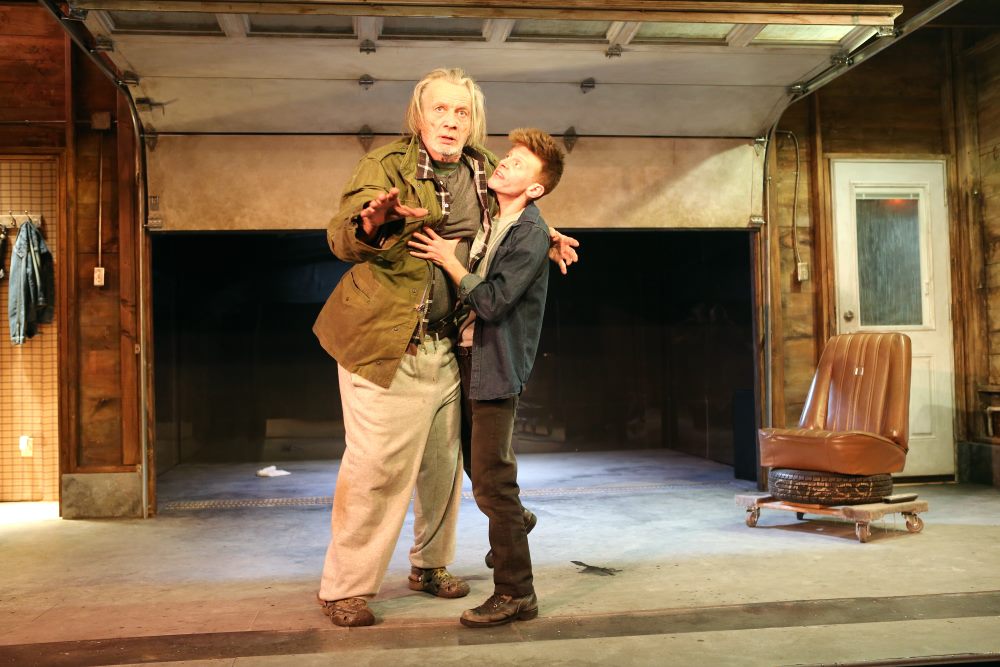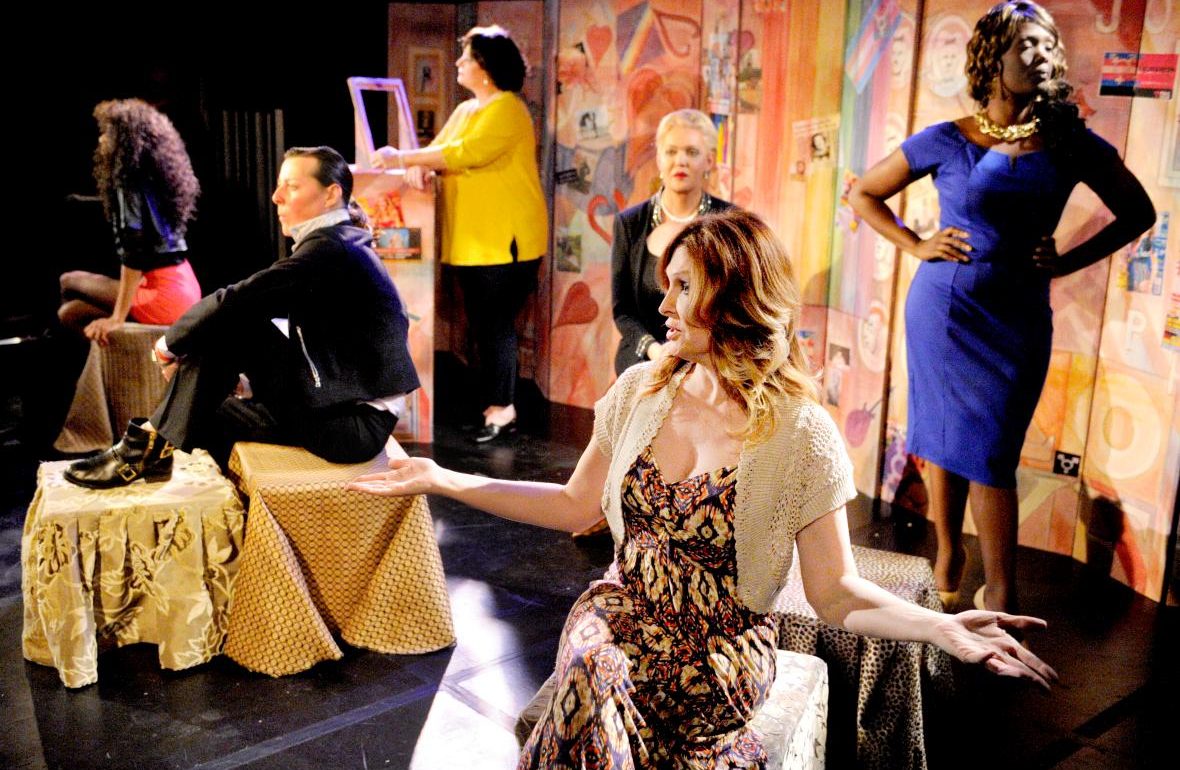In 2011, playwright/producer Paul Lucas was having a conversation with a friend, an HIV-positive gay man who was paralyzed from the waist down and living in a nursing home. The topic eventually turned to transgender performers, to which Lucas’s friend responded, flippantly, “Oh, I don’t really believe in that—that whole transgender thing. I can say I’m a unicorn, it doesn’t make me a unicorn.”
For Lucas, who is also gay, the statement came as a shock, and in it was loaded an overlooked history of the LGBTQ movement, which has often historically ignored or even ostracized the trans strand in that rainbow. “There’s this LGBT umbrella, and obviously the T is outside it,” says Lucas, recalling the memory earlier this month.
Lucas was speaking from a rehearsal for his newest show, which grew out of that 2011 conversation. The show is called Trans Scripts, Part 1: The Women, running at American Repertory Theater Jan. 19-Feb. 5. It’s the product of 75 interviews (and almost 300 hours of material) that Lucas conducted with trans individuals around the world, from California to Virginia, from India to Australia.
“I wanted to go out and speak to people and have them tell me about their experience and put their experiences onstage, and not to fictionalize anything,” Lucas says. Trans Scripts, Part 1 features the stories of seven real-life trans women, enacted by a cast of almost entirely trans female actors. The point was to “not to shy away from differing opinions, to understand the breadth of the experience, the breadth of the stories.”
Faithfully depicting the intricacies of the trans experience is also the goal of trans playwright Basil Kreimendahl, whose play Orange Julius is currently running in a coproduction by Rattlestick Playwrights Theater and Page 73 (Jan. 10-Feb. 12). But though the play features a character described in the script as “transmasculine,” Kreimendahl is careful to point out that the play isn’t about “being trans.”
“I really wanted to explore the children of Vietnam vets and how the war affects the children of those soldiers and their relationship to them,” explains Kreimendahl, whose own father fought in Vietnam. That may have been the writer’s first impulse, but when Kreimendahl was exploring the relationship between the trans character Nut (played by trans actor Jess Barbagallo) and his father, Orange Julius also became a deep dive into “masculinity and this complication of this father/son relationship, and a trans person’s desire to have their father see them as a man and as a son,” Kreimendahl explains. That may be why the playwright describes Orange Julius as the most personal work he’s ever written.
Orange Julius and Trans Scripts are just two among a number of current or upcoming shows that heavily involve trans artists, either behind the scenes or onstage. Others include Charm by Philip Dawkins at Mosaic Theater, featuring three trans actors (Jan. 5-29); Men on Boats by Jaclyn Backhaus at American Theater Company, starring a number of trans actors, directed by Will Davis, who is also trans (Jan. 6-Feb. 12); and various productions around the country of Hir, by gender nonconforming artist Taylor Mac, which features a trans male character (Washington, D.C.’s Woolly Mammoth Theatre, Chicago’s Steppenwolf Theatre, BLUEBARN Theatre in Omaha, Neb., and Phoenix Theatre in Tucson, N.M.). American Theater’s Davis will direct Charm at MCC Theater Off-Broadway in the fall; the production is currently seeking trans and gender nonconforming actors.
In recent years, a number of trans artists have taken issue with the way trans stories are presented onstage (and on screen), as the playwrights and performers are very often cisgender. In an interview last year with The New York Times, trans playwright MJ Kaufman said, “Theatres would rather produce work about us, not by us right now. We should get to tell our own stories first.” Last year, Kreimendahl wrote an article for HowlRound called “Hierarchies of Power: Cisgender Playwrights and Trans Characters” on the same topic. (We also wrote about it.)
Stories about the trans experience written by cis writers, says Kreimendahl, usually feel like they’re “a view from the outside. Often the work might be about more that how these straight people are handling this trans character, as opposed to this trans character is also his own person handling their stuff from their perspective.”
Trans Scripts actor Bianca Leigh agrees.
“It’s always the same trope,” she says. “‘Poor sad tranny,’ you know? And the reality is, although life can be hard, life can be hard for everyone.” Here she leans forward for emphasis. “The world is a rough place. Obviously there’s challenges and non-acceptance and all that stuff, but what I’ve seen over the years are trans women and trans men transitioning to a happy, productive life! And we don’t see that enough.” Leigh is also trans and has been with Trans Scripts since its early developments, and performed it at Edinburgh Festival Fringe, where it won the Fringe First prize.
Stories about self-acceptance are threaded throughout Trans Scripts. Lucas considers himself a “custodian” of the stories his subjects told him. That is why the entire play is verbatim text from seven trans women he interviewed, edited for clarity. As Lucas puts it, “I’m not a cis person telling anybody’s story. I’m a cis person listening to dozens of stories and then trying to honor what I have heard onstage.”
True to Trans Scripts’s heterogeneous approach, some women present themselves as traditionally feminine while others take a more androgynous approach. Some are upfront about their identity; others prefer to blend in. The point is to show that there is no such thing as a single quintessential trans narrative but rather many. Lucas is also hyper-aware of what is left out of Trans Scripts. “It doesn’t deal with the younger trans experience, and younger trans experience from my observation is quite different,” he says. A subsequent Trans Scripts, he says, will deal with trans men and gender nonconforming individuals.

What works like Trans Scripts and Orange Julius allow for is the opportunity for trans individuals to tell their stories in their own words. Both Leigh and Kreimendahl agree that trans actors have increased in visibility, and theatres are now taking more active steps to cast trans actors in trans roles, but at the same time, trans writers are still underrepresented.
Leigh is part of a trans artists collective that has advocated for increasing representation of trans artists on and offstage. For Charm at Mosaic Theater, which was written by a cis playwright, the group curated a pop-up bookstore in the theatre lobby to sell works by trans and gender nonconforming artists of color (and they’re currently working to recreate the bookstore for the MCC production of Charm). To Leigh, actions like the bookstore or programming talkbacks with trans individuals are ways to make sure the story being represented onstage isn’t just a tourist commodity for cis audiences—that it will also benefit the greater trans community.
“We want to see theatres doing more,” says Leigh. “So if you’re doing a play about a trans person, what are you doing for the community? Are you doing any special talkbacks? Are you doing any special programs?” In a similar vein, for Trans Scripts, ART is hosting an adjoining festival featuring works by trans performers and writers called the I.D. Festival.
For Kreimendahl, it’s not that cis folks can’t write about the trans experience; after all, he notes, “As a writer, I want to be able to write not just trans or queer stories.” In fact, his next play We’re Gonna Be Okay is about two cisgender heterosexual couples; it’s set to premiere at the 2017 Humana Festival of New American Plays. At the same time, he says, there’s an obligation to get the subject right. “If we’re going to tell another story, we have to be, like, really conscious of what we’re doing, and what we’re saying, and are we able to tell that story or not.”
Leigh concurs. “It’s not someone saying, ‘Oh, you’re a cis man, you shouldn’t be writing about this.’ It’s about: Why isn’t the work of trans male, trans female playwrights being done more often?” That’s why she encourages theatres who want to program a trans-themed play by a cis writer to make sure to also program plays by trans writers. “Do both. Do those plays also.”
At the end of the day, as Leigh’s character in Trans Scripts puts it, “We have hundreds and thousands and tens of thousands and hundreds of thousands of stories.” And those stories, in all of their complexity and authenticity, deserve to be onstage.


